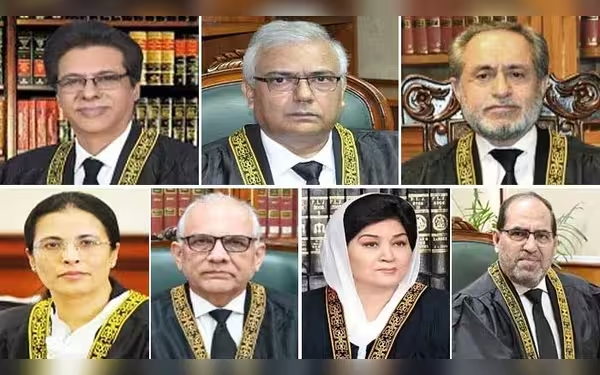Wednesday, January 15, 2025 09:35 PM
Supreme Court of Pakistan Hears Key Cases in Constitutional Bench Session
- Supreme Court dismisses frivolous election petition with fine.
- Justice Mandokhail emphasizes voter participation in democracy.
- Bench addresses independent candidates' affiliation with political parties.
 Image Credits: geo
Image Credits: geoThe Supreme Court of Pakistan convenes a constitutional bench to address key pending cases, emphasizing voter participation and dismissing frivolous petitions.
On November 18, 2024, the Supreme Court of Pakistan convened a seven-member constitutional bench to address several pending cases that have been awaiting resolution. This significant gathering, led by Justice Amin-ud-Din Khan, included notable justices such as Justice Ayesha Malik, Justice Muhammad Ali Mazhar, Justice Hassan Azhar Rizvi, Justice Jamal Khan Mandokhail, Justice Naeem Akhtar Afghan, and Justice Musarrat Hilali. The bench's primary focus was to deliberate on various legal matters that have implications for the electoral process and governance in the country.
During the proceedings, the court dismissed a petition that sought to declare candidates receiving over 50% of votes as successful in elections. The petitioner, Advocate Chaudhry Akram, faced a fine of Rs20,000 for what the court deemed a "frivolous" petition. Justice Mazhar raised a critical question regarding the constitutional basis for requiring a candidate to secure 50% of the votes to win, emphasizing that election outcomes should reflect the votes cast by the electorate. Justice Ayesha further probed the petitioner about the violation of any fundamental rights, reiterating that the Supreme Court does not possess the authority to create new laws.
The petitioner argued that Parliament plays a crucial role in shaping the lives of citizens, but Justice Khan countered that Parliament does not make decisions regarding the electoral process in such a manner. Justice Hilali pointed out that while everyone has the right to vote, many individuals choose to watch television on polling day instead of participating in the electoral process. This observation led to a discussion about the responsibilities of voters and the importance of civic engagement.
In a notable exchange, Justice Mandokhail inquired whether the petitioner had cast their vote in the February 2024 elections. Upon the petitioner’s admission of not voting, Justice Mandokhail remarked that such behavior disrespects the Constitution, highlighting the importance of active participation in democracy. The bench ultimately imposed a fine for frivolous litigation, dismissing the petitioner’s suggestion of a Rs100 billion penalty aimed at reducing national debt, citing the impracticality of such a proposal.
Additionally, the bench addressed a plea regarding the mandatory affiliation of independent candidates with political parties. The petitioner, appearing via video link, acknowledged that the issue had already been resolved, leading to the dismissal of their appeal. The court also heard a case concerning the Income Levy Tax Act 2013, where the Federal Board of Revenue's counsel indicated that many involved parties had not received notices due to incorrect addresses. The court ordered that notices be published in newspapers to ensure compliance.
Furthermore, the bench dismissed a petition seeking to blacklist the real estate company Bahria Town due to the petitioner’s failure to appear in court. Looking ahead, the bench is set to hear several significant cases, including a challenge by the Pakistan Tehreek-e-Insaf (PTI) against specific sections of the Sindh Local Government Act 2013 and a petition from Muttahida Qaumi Movement-Pakistan (MQM-P) regarding the 2017 Population and Housing Census.
As the Supreme Court continues to address these pressing legal matters, it underscores the importance of judicial oversight in maintaining the integrity of the electoral process and governance in Pakistan. The outcomes of these hearings will not only shape the legal landscape but also influence public trust in the democratic system. Citizens are encouraged to remain informed and engaged, as the decisions made in these courtrooms have far-reaching implications for the future of the nation.













